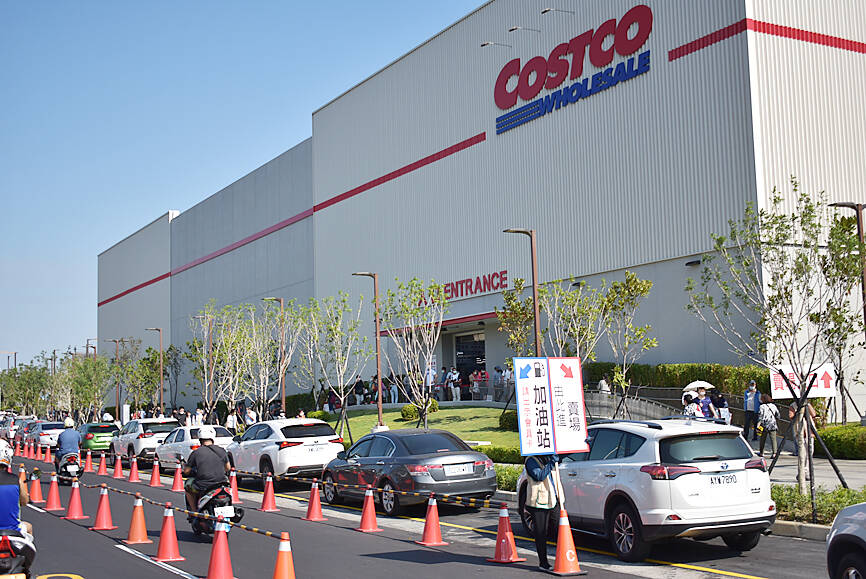Cathay United Bank (國泰世華銀行) yesterday said its co-branded credit card partnership with Costco Wholesale Taiwan Ltd (台灣好市多) is to end on Aug. 7 next year, affecting 2.7 million card holders.
Once the partnership expires, co-branded credit card holders will no longer be able to use them to make purchases at Taiwan’s 14 members-only Costco outlets.
Chinese-language media reported that Taipei Fubon Commercial Bank (台北富邦銀行) recently acquired the exclusive partnership by paying NT$1.2 billion (US$37.4 million) in royalty fees — NT$200 million more than Cathay United paid in 2013 to replace Costco’s preceding partner, CTBC Bank (中信銀行).

Photo: Chang Jui-chen, Taipei Times
During the decade-long alliance, Cathay United Bank grew the number of co-branded credit card holders threefold, from 900,000 in 2014 to 2.7 million today, the lender said.
Costco is touted as the most popular warehouse club in Taiwan. It only accepts the co-branded credit card for cashless purchases.
The US retailer said in a statement yesterday that it is weighing its options regarding a new co-branded credit card partner.
Members’ interests are its primary concern, Costco added.
Taipei Fubon Bank had not commented as of publication time last night.
As of September, CTBC Bank remains the largest credit card issuer in Taiwan with 8.32 million cards, followed by Cathay United Bank’s 7.89 million, government data showed.
By measure of active credit cards — defined as having been used in the past six months — Cathay United Bank places first with 5.57 million, more than CTBC Bank’s 5.18 million, the data showed.
Taipei Fubon Bank ranks fifth in terms of active cards at 4.57 million, and could seize the No. 1 spot if it partners with Costco, as that would boost its number of active credit cards to 5.64 million, analysts said.
Cathay United Bank, the banking arm of Cathay Financial Holding Co (國泰金控), did not try to top Taipei Fubon Bank’s offer, because it was concerned that business expansion would be limited unless Costco Taiwan adds new outlets, analysts said.
Issuing credit cards also generates little profit after factoring in bonuses, discounts, credit and other costs, analysts said.
By contrast, Taipei Fubon Bank, the banking arm of Fubon Financial Holding Co (富邦金控), has ample ability to use creative methods to generate business given its affiliation with e-commerce operator Momo.com Inc (富邦媒體) and telecom operator Taiwan Mobile Co (台灣大哥大), analysts said.
Upon the termination of the alliance, Cathay United Bank is encouraging clients to switch to its upcoming CUBE credit cards, which are to have similar cash rebates as their cobranded cards, as well as other benefits.
The bank said it would disclose the details of the CUBE program soon.

MULTIFACETED: A task force has analyzed possible scenarios and created responses to assist domestic industries in dealing with US tariffs, the economics minister said The Executive Yuan is tomorrow to announce countermeasures to US President Donald Trump’s planned reciprocal tariffs, although the details of the plan would not be made public until Monday next week, Minister of Economic Affairs J.W. Kuo (郭智輝) said yesterday. The Cabinet established an economic and trade task force in November last year to deal with US trade and tariff related issues, Kuo told reporters outside the legislature in Taipei. The task force has been analyzing and evaluating all kinds of scenarios to identify suitable responses and determine how best to assist domestic industries in managing the effects of Trump’s tariffs, he

TIGHT-LIPPED: UMC said it had no merger plans at the moment, after Nikkei Asia reported that the firm and GlobalFoundries were considering restarting merger talks United Microelectronics Corp (UMC, 聯電), the world’s No. 4 contract chipmaker, yesterday launched a new US$5 billion 12-inch chip factory in Singapore as part of its latest effort to diversify its manufacturing footprint amid growing geopolitical risks. The new factory, adjacent to UMC’s existing Singapore fab in the Pasir Res Wafer Fab Park, is scheduled to enter volume production next year, utilizing mature 22-nanometer and 28-nanometer process technologies, UMC said in a statement. The company plans to invest US$5 billion during the first phase of the new fab, which would have an installed capacity of 30,000 12-inch wafers per month, it said. The

Taiwan’s official purchasing managers’ index (PMI) last month rose 0.2 percentage points to 54.2, in a second consecutive month of expansion, thanks to front-loading demand intended to avoid potential US tariff hikes, the Chung-Hua Institution for Economic Research (CIER, 中華經濟研究院) said yesterday. While short-term demand appeared robust, uncertainties rose due to US President Donald Trump’s unpredictable trade policy, CIER president Lien Hsien-ming (連賢明) told a news conference in Taipei. Taiwan’s economy this year would be characterized by high-level fluctuations and the volatility would be wilder than most expect, Lien said Demand for electronics, particularly semiconductors, continues to benefit from US technology giants’ effort

‘SWASTICAR’: Tesla CEO Elon Musk’s close association with Donald Trump has prompted opponents to brand him a ‘Nazi’ and resulted in a dramatic drop in sales Demonstrators descended on Tesla Inc dealerships across the US, and in Europe and Canada on Saturday to protest company chief Elon Musk, who has amassed extraordinary power as a top adviser to US President Donald Trump. Waving signs with messages such as “Musk is stealing our money” and “Reclaim our country,” the protests largely took place peacefully following fiery episodes of vandalism on Tesla vehicles, dealerships and other facilities in recent weeks that US officials have denounced as terrorism. Hundreds rallied on Saturday outside the Tesla dealership in Manhattan. Some blasted Musk, the world’s richest man, while others demanded the shuttering of his